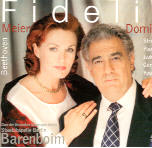With a dozen Fidelios on the market, this one doesn’t really have much of a chance, nor does it have particularly grand appeal. Barenboim’s leadership is a great asset–he paces with excitement and leads a taut, exciting story while always remaining considerate of his singers. And, as we might expect, his orchestra and chorus play and sing brilliantly for him. This set grew out of a live performance in which all dialogue was cut and replaced, at opportune moments, with a flashback narration by Leonore. Here we get only the music Beethoven composed with no dialogue at all; the text Leonore spoke is printed in the accompanying booklet. I’m not a great fan of spoken dialogue in opera–I admit to always skipping over those endless spiels in Magic Flute–but Fidelio needs dramatic glue to keep it flowing and this presentation makes it seem more like a set of highlights without any.
The quality of the soloists varies: Soile Isokoski and Werner Güra make a nice pair of ingenues, with pure tone and nice involvement. René Pape’s Rocco is probably the best on record; he manages exactly the right combination of dope and villain and he sings gloriously. Falk Struckmann convinces us of Pizarro’s rottenness and also finds his way around the difficult music. Placido Domingo’s Florestan is handsomely sung–almost too Italianately elegant at times–but well thought through, and if not quite on the Jon Vickers level, certainly not terribly far away. The real minus here is Waltraud Meier’s Leonore. No matter what she’s called, she sounds like an ugly-voiced, pushed-up mezzo, and despite her obvious intelligence and sensitivity to the text, her nasty voice and errant pitch rule her out of the competition. So–a mixed bag. Domingo and Barenboim fans will need this, but it’s almost like getting only a part of Fidelio (Barenboim, by the way, begins the opera with the Leonore Overture No. 2; an appendix includes the other three overtures Beethoven wrote for this work), and Meier is awful. If you don’t want Klemperer on EMI with the spectacular Ludwig and Vickers, why not go for the recent Halasz reading on Naxos? It’s good, it’s cheap, and there’s just enough dialogue to keep the plot intelligible.
































